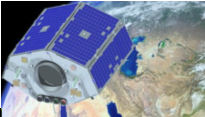Not many stakeholders are aware that there is a bill before the
senate seeking to firm up the role of NIGCOMSAT Limited in the
nation’s communication space. Already okayed by the House of
Representatives to formally create Nigerian Communications
Satellite Corporation, the bill is waiting to pass through the
rigorous legislative processes at the Senate before it could then
get assent of the president. It has been at the Senate since
March.
NIGCOMSAT (Nigerian Communications Satellite Limited) was
originally part of NASRDA (National Space Research and Development
Agency (NASRDA)) established by the Obasanjo government to begin
Nigeria’s entry into the global space industry. As expediency
would warrant, NIGCOMSAT Limited was carved out of NASRDA to
concentrate on the more specific agenda of meeting Nigeria’s
communication needs via satellite infrastructure backbones. NASRDA
has remained committed to the broader agenda of satellite research
using satellite resource for geographical imagery and the likes.
It has three low earth orbit satellite in space (two are new
satellites) while NIGCOMSAT has only communication satellite:
NIGCOMSAT 1R, actually a replacement for a faulty one that was
launched as Africa’s first communication satellite.
Satellites have many uses. They range from the military to the
commercial. All nations are motivated into global satellite arena
chiefly for “political, commercial, and military motives. All
satellite programmes are a source of pride and of revenue.”
Satellites are viable vehicles for socio-economic changes and are
extra-ordinary spy machines for national intelligence and
security. Part of the reasons that necessitates the creation of
NASRDA and NIGCOMSAT was to address the increasing need for
technology aided intelligence for national security whether
internal or external. As one Nigerian expert puts it: “in the
emerging global technology space, new challenges and opportunities
for our nation require strategic review and tactical
introspection.”
Tactical introspection means asking questions that demand answers.
Does NIGCOMSAT and its communication resource demand to be
positioned by policy and by an Act to serve this country’s
intelligence gathering against its external and internal enemies
particularly home-grown terrorists? Why is there no clear-cut Act
to position NIGCOMSAT as a strategic national communication
resource to enforce the country’s economic, political and security
interests? Do our strategic goals for communication and security
admit NIGCOMSAT as a strategic resource to achieving those goals?
Why since its commercial launch is NIGCOMSAT not the primary
provider of bandwidth to all MDAs (ministries, departments and
agencies) so that foreign communication commercial satellite
providers become secondary providers? Does government have the
best interest of its own investment in NIGCOMSAT at heart when the
resource itself does not primary serve government?
Government must have its own strategic communication resource to
rely on at all times. Proponents of a 100% private sector led
economy would conveniently forget that the crash of the western
economy including the fumbling US economy is private sector led.
Now, it is taking the intervention of government in the western
economic spheres with huge public fund to restore confidence in
the economy and get it moving again on its feet. Why is the
thriving economy of China with huge government presence
conveniently ignored in the face of the collapse of private sector
led economy of the west?
All over the world, increase in demand for satellites has made
space to go from “being a
preserve of the superpowers to a crowded commercial arena. New
governmental actors—
Europe, China, and India—have entered the market. Space services,
in communications, remote sensing, and navigation, are now
commercially available in sufficient quantity and quality to
change the national security equation for the United States. Other
countries including Nigeria and Venezuela have joined the fray and
depending on their level of funding and political willpower, their
satellite ventures can either bring them great benefits or simply
become awry misadventures. India is a good model to follow. It
shares so many traits with Nigeria. A population always eight
times that of Nigeria; huge poverty and wealth disparity, massive
communication needs; and an expansive landmass. The Indian
advantage is that it boasts of a more organised economy and a
functional democracy. And of course, a far more advanced satellite
industry. Ours is still at its extreme infancy stage. It must be
encouraged to grow.
What is the import of the rising demand for global economy? I will
quote from a recent report on how rising number of commercial
satellites could impact on the US national security titled
Commercial Satellite Services and National Security: We Are Not
Alone. “Demand for satellites and other information technologies
reflect the increasing importance of services and information in
the international economy. Services have been the fastest growing
sector of international trade for the past 20 years and are now
worth perhaps a quarter of all international trade. Services
depend on the flow of information, so demand for information
technologies including satellites has increased. The number of
commercial satellites and the number of companies supplying these
satellites and satellite services will continue to grow in
response.
“The number of foreign satellite programmes (private and
governmental) that provide communications, navigation, and imagery
services have increased dramatically over the last 10 years and
continue to expand. Demand for satellite services has created a
new space environment where most activity is commercial.
Commercial satellite services fall into three categories—
communications, imagery and navigation. Access to these commercial
services allows potential opponents to narrow the U.S. advantage
in information dominance. An array of foreign communications,
remote sensing, and navigation satellites have been built and
launched in response to strong commercial and government demand.
These services are sufficient for military needs.” In the last few
10 years, developing economies from South America, Asia and Africa
(Nigeria, South Africa and North Africa) have joined global space
and satellite capabilities.
How do all these fit into the global satellite ecosystem for
NIGCOMSAT t? By law, government must back NIGCOMSAT’s role in
national development by an Act. Part of its functions captures
those roles. They include “designing, manufacturing in-orbit
launch and operation of a communication, satellite in respect of,
but not limited to telephony, television, radio, broadcasting,
broadband internet services, navigation, and global positioning
system with the transmitters, teleports, transponders, earth
stations, terminals, antennae, frequency bands.”
The role also includes but not limited to “setting up,
establishing, operating, managing, marketing, sales and
maintaining in-orbit communications satellites, whether in respect
of satellite services, telephony (urban and rural), television,
HDTV, DTH, teleprocessing, telepresence, tele-education,
telemedicine, e-government, e-commerce, telegraph, telemetry,
radio, mobile and paging, internet services, real time monitoring
services in-shipping and freight handling, petroleum pipeline,
equipment installation, inventory control and cash flow,
supervisory control and data acquisition, fleet management
systems, maritime and aviation services with the employment of
navigation and global positioning systems with coverage over most
of the earth with particular focus on Africa.”
NIGCOMSAT needs full recognition by law as a government and
commercial entity. Its mandate to actualise our national
communication destiny is fully articulated in its mandate. The
mandate underscores its relevance as a strategic national
communication resource in the face of its inherent value
proposition to “improve the fast growing ICT landscape in Nigeria
especially in the areas of broadband Internet connectivity and
network transmission coverage area; to domesticate broadband
services by curtailing capital flight, which has stood at about
$500m yearly; and to key into the overall policy-thrust of the
Ministry of Communications Technology for ubiquitous broadband
access as they concern the attainment of the Millennium
Development Goals (MDGs) as well as this present government
transformational agenda.
NIGCOMSAT’s relevance in national economic development and
national security is not debatable. What is in doubt is the level
of awareness among key stakeholders as to how NIGCOMSAT fits into
the scheme of things. It is in our national interest to secure
NIGCOMSAT interest. This much motivated Nigeria’s entry into the
global space industry. The country cannot afford to detour now or
delay key decisions to get NIGCOMSAT to begin to fulfil its
mandate to the Nigerian nation. The Senate and Mr. President must
act now on that Act.


































